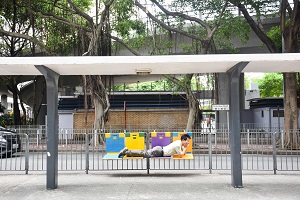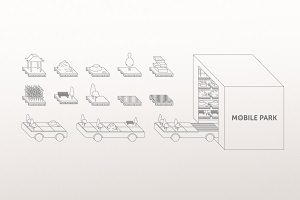Design Trust Futures Studio 2017 | Shortlisted for the 2018 Beazley Designs of the Year
24. 9. 2018
Design Trust Futures Studio 2017 has been shortlisted for the 2018 Beazley Designs of the Year Award. Since 2008, Design Museum in London has presented this annual award to recognise the world’s most innovative design concepts and products. Design Trust Futures Studio 2017 is included in a shortlist of 87 nominees in categories spanning fashion, graphics, architecture, product, digital and transport. On view at the Design Museum from 12th September 2018 to 6th January 2019 are selected works including photographic documentations of Design Trust Futures Studio 2017, as well as railing chair prototypes of “Part(k) of the City” by designer mentor Gary Chang and designer mentees Zoey Chan, DickWai Lai and Jose Fu, as part of Design Trust Futures Studio 2017 “Small is Meaningful” curated by Marisa Yiu (Co-founder/ Executive Director, Design Trust).
Conceptualised by Co-founder and Executive Director of Design Trust, Marisa Yiu, Design Trust Futures Studio is a cross-disciplinary think tank. Bringing together design experts, the programme focuses on creating meaningful outcomes that will impact society in Hong Kong and the Greater Pearl River Delta Region.
The theme of the inaugural edition of Design Trust Futures Studio was “small is meaningful”. Groups were given the challenge to examine the importance of smallness in local communities and how it could be harnessed to create positive change. The ultimate goal is to inspire new ideas for prototype micro-parks in Hong Kong. The four micro-park concepts from Design Trust Futures Studio 2017 include:
Part(k) of the City
By Zoey Chan (architecture and landscape graduate), Jose Fu (new media and technology designer based in Shenzhen) and DickWai Lai (advertising and branding designer) with Mentor Gary Chang
Part(k) of the City explores the possibilities of creating micro parks through railing interventions. It looks at how railings, a critical element of our city that are usually neglected and overlooked in our everyday lives, can be reclaimed and adapted into pleasant micro public sharing spaces. Inspired by how people have been adapting railings for different purposes, the team endeavours to go beyond the linear and singular use of railings (as city management barriers) to create a playful design intervention with minimal proportions (foldability and portability) with maximised functions (seating, reading, sharing).
Skip-Park
By Cesar Jung-Harada (environmentalist, new technology maker), Stephen Ip (young practicing architect) and Ffion Zhang (landscape architecture recent graduate) with Mentor Mimi Hoang
Skip-Park utilises street skips (commonly used in Hong Kong to store and transport construction debris) as a way of bringing change to a community. The concept involves transforming construction skips into a network of mobile micro-parks that can be deployed on demand. Combining a playscape and an algae wall designed to absorb excess CO2, the Skip-Park offers a low-cost green solution for densely populated and polluted districts such as Mong Kok. Residents of the neighbourhood can also monitor changes in air quality through a series of sensors installed in the skip.
MobilePark
By Wendy Wu (urban designer and researcher based in Shenzhen), Ricky Lai (graphic and branding designer) and Xavier Tsang (industrial and product designer) with Mentor Sam Jacob
Focused on a speculative future Hong Kong, MobilePark is a park “delivery system” that allows communities and individuals to order personalised park experiences on demand. By accessing a mobile application, users can construct their own temporary micro-parks by selecting a variety of modules and features. Once an order is received, the components, which are stored at a centralised facility, will be delivered through a third-party truck-sharing scheme for users to enjoy over a designated period of time.
Ting Yat Ting
By Sylvia Chan (architecture critic and design writer), Vivian Ng (industrial and production design recent graduate) and Samuel Wong (architecture graduate) with Mentor Stanley Wong
Ting Yat Ting (Chinese: to pause for a moment) is a pop-up micro-park that can be planted at different locations in Hong Kong. Envisioned as more than just a public resting space, the semi-enclosed pavilion invites users to take a break from their busy lives to engage with the city on a deeper level. Stepping inside, visitors will view a slideshow of images captured by a camera installed on top of the pavilion. These photographs depict seemingly insignificant elements of the neighbourhood that are often overlooked. Users are encouraged to operate the camera device to frame their own unique perspective of surrounding streets, and uncover surprising moments of Hong Kong.
Stay tune for more details on Design Trust’s Instagram and Facebook page. Find out more about Design Trust Futures Studio here:
DTFS 2017 “SMALL IS MEANINGFUL”:
https://designtrust.hk/design-trust-futures-studio-2017/
DTFS 2018 “Play is for the people”:
https://designtrust.hk/design-trust-futures-studio/




















